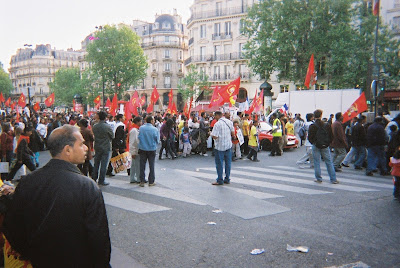On Friday, May 1, 2009, Tamil protesters added to the masses marching and demonstrating throughout Paris on the worker's holiday, but not just to demand independence in South Asia, as one would expect of the reputed nationalists and as the New York Times reported, but to protest the genocide of their ethnic group in Sri Lanka.

Tamil Protesters at la Bastille, 05.01.09, photo credit me, Pur.
Concerning the May Day protests throughout Europe, The New York Times wrote:
May Day this year came at a delicate moment. The economic crisis is dragging on and a palpable sense of outrage is growing among those who have lost their jobs, savings or pension funds. Worker solidarity was on display most visibly in France, where the eight main unions marched together for the first time.The NYT went on to list the numbers of protesters in France measured by the General Confederation (which "estimated the national turnout at around 1.2 million, five times larger than a year earlier, and at 160,000 in Paris") and the National Police, who estimated 465,000 across France and 65,000 in Paris, "including some 8,500 ethnic Tamils protesting for an independent homeland in Sri Lanka."
The May Day Tamil protests, however, showed signs that read, "Sauvez-nous, les Tamouls" and "Aidez-nous," meaning 'Save us' and 'Help us,' words one usually reads on the signs of panhandlers followed by the phrase, "I am hungry." What were they asking for help with? From what did they need to be saved? An independent state has been on Tamil activists' agendas since the Tamil United Liberation Front (TULF) formed on May 15, 1976 (see this timeline of Sri Lankan ethnic conflict for more info), but what would so many Tamils be doing asking for their independence at protests in France?
The Tamil activists are actually protesting the treatment of members of their ethnic group as terrorists. Though Tamil separatists have been credited with pioneering methods of terrorism such as hijacking vehicles to use as weapons and suicide bombings (as when a small woman representing the Tamil Tigers blew herself up and assassinated the Prime Minister of India in 1991), and the history of the ethnic conflict is colored with other assassinations, they are not aligned with Muslim extremists or international terrorist networks like Al Qaeda.
At République, 05.09.09, photo credit me, Pur.
All weekend ethnic Tamils have had Place de la République in Paris, the site of a large multi-faceted protest on March 19, 2009, on lock down. Tents are pitched in the small parks surrounding the République monument, where innumerable Tamils are camped out chanting in French and English phrases like "Ceasefire now!" The signs accuse world leaders of turning a blind eye to the genocide of Tamils, and many plastered all over the park fences depict the gruesomely mutilated bodies of Tamils killed on supposed grounds of terrorism.
At République, 05.09.09. Pur.
These protests seem less official than the French standard, since, though their May 1st manifestation at Bastille was properly barricaded by Police, when they marched up through the 11th arrondissement carrying banners and Tamil Tiger flags, they had to walk on the sidewalk. On the March 19th protests, Boulevard Voltaire was completely closed down for the demonstrators, from République to Nation.
Unions marching down Boulevard Voltaire, 03.19.09. Pur.

North of Bastille, Tamil Tiger flags flying high marching up the sidewalk. 05.01.09. Pur.
On May 1st, perhaps given to the magnitude of demonstrations citywide, the Police neglected to even shut down the streets surrounding Bastille, and French police directed traffic between the flow of Tamils and passing cars and buses. Likewise, the camps set up at République are considerably more contained than spectacles the vast traffic circle has seen in the past, though a young voice leading chants through large speakers can be heard several blocks away.
The protests and strikes across France this year like March 19th's have been largely due to, in addition to unrest from the financial crisis pointed out by the NYT, the French public's general scathing dissatisfaction with President Sarkozy and everything he says and does. Thus, since some Tamil signs directly call out President Sarkozy may explain why, though the Tamil protests have much less to do with things within the control of the French government than the protests against cutting education funding and for worker's rights, they have been allowed to sit on the grass in a city where walking on the grass in a park is usually a crime. (What do you think this is, England? With all it's English gardens?) Although, protesting is such a way of life in France that it is most likely easier to legally conduct a large scale public demonstration and keep things peaceful and productive. (May Day protests in Germany turned violent, those in Paris did not [NYT]).
Needless to say, this calls to mind grime singer M.I.A. whose father was a Sri Lankan revolutionary and who has been persistently outspoken on the subject of war in her home country. These protests have more to do with international human rights and objecting to discrimination as M.I.A. describes in her wildly popular single "Paper Planes," than with only demanding their own state.
You could argue that their adoption an anti-Tamil-genocide cause is a polemic to draw attention to their separatist one. One sign read something like, "Aid is given to end the ethnic conflicts in Africa, but what about in Sri Lanka," and implicitly derogating the gravity of one serious problem to draw attention to another is not fair reasoning. But the Boston Globe's coverage of the issue from this February op-ed legitimizes the claims.



No comments:
Post a Comment